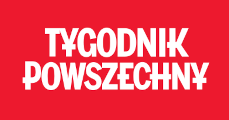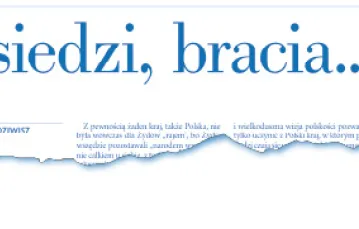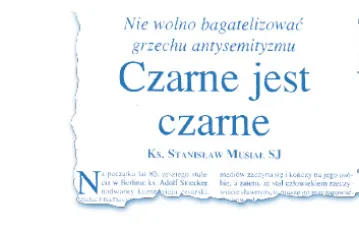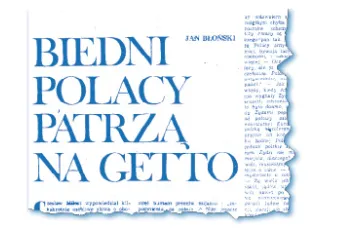Wykupienie dostępu pozwoli Ci czytać artykuły wysokiej jakości i wspierać niezależne dziennikarstwo w wymagających dla wydawców czasach. Rośnij z nami! Pełna oferta →
You once said that all Europeans, even those who call themselves atheists or advocates of enlightened rationalism, are mystics. Why can’t we free ourselves from mysticism?
Mysticism is bound up with European culture to a greater extent than we realize. These days there are voices from all sides proclaiming that this fascinating tradition is waning, losing importance, finding itself on the sidelines of contemporary sociocultural changes. It’s true that mainstream contemporary culture, as a result of the conscious or intuitive activities of its participants, is attempting to purify itself of all traces of mysticism (this has been going on since the Enlightenment). Contemporary culture creates the appearance of this “purity." But mysticism is preserved by our languages.
The influence of the mystical tradition on the development of languages has forced and continues to force even the most secularized minds to make use of concepts of largely mystical provenance. I say this as an atheist who views this tradition critically, yet is nevertheless convinced that it’s impossible to live without some sort of belief.
It should be emphasized that belief-as a category-is used today in contexts that at first sight have no connection to religion, but that upon closer analysis reveal this connection clearly. I think the process whereby our language became saturated with mysticism is to be sought in the pre-Christian era.
The European Union guarantees freedom of religion, and
at the same time makes all efforts to maintain religious neutrality.
In the European Parliament there are rooms designated for
reflection (the so-called meditation rooms) where persons of all
faiths can gather, provided they leave the symbols associated with their religions outside. What is your assessment of this idea
to create such an ex-religious space?
It’s an excellent decision. It isn’t directed against religion as such, but rather the intent was to balance out the influence of individual faiths. However, one should ask whether it’s possible to maintain such an equilibrium. Is it possible to devise a neutral model for interaction between representatives of different faiths? Is mutual respect possible, the condition for which the ability is to yield up positions characterized by claims to universalism? This is easily achieved in the two rooms belonging to the European Parliament-all that’s needed are the appropriate instructions. Reaching such an agreement all over Europe-a true religious melting pot-is more problematic.
Are critics of this neutral model of coexistence for diverse
religions fighting it on behalf of the universalism of their
own faith?
What is at stake in the game for the EU religious neutrality is the upholding of a certain concept of politics based on the conviction that theology and politics shouldn’t mix, as they have done so often in the past. One could conduct a test by posing your previous question to the representatives of various social groups. I’d be willing to bet that most of the protests against the European Parliament’s decision to establish an ex-religious sphere would come from zealous supporters of politicized religion or, vice versa, religion-based politics. Such people are fighting over the shape of contemporary politics. Religion in this case is only a tool used to help legitimize a certain form of government. Mystical lubricant is needed to keep the machine that manages the society running smoothly.
This “mystical lubricant" is described in a somewhat different context by one of your favorite writers: Béla Hamvas.
That’s correct. It’s a quote from his novel “Carnival." Ham-vas died in 1968, but his works and his worldview have lost none of their relevance. Two contradictory impulses coincide within him: rationalism and mysticism. He believed that one cannot exist without the other. More than this: without maintaining a balance between these forces, society is unable to function properly.
Let’s not forget that Hamvas was above all a writer. He was interested in the complexities of human nature, in the pressures that arise when contradictory forces collide. He didn’t shy away from portraying idiots, characters overpowered by ideological mania. He not only portrayed them, he climbed into their shoes; for artistic purposes he impersonated people he disagreed with. He felt that if a writer isn’t able to create a convincing representation of an idiot, he’s not a good writer. Hamvas today would no doubt defend the need for belief, but he’d also stand guard at the boundary between theology and politics.
I understand that you yourself advocate this view…
I’m no stranger to the rational stance. I think that even in Central Europe, where history overflows with numerous examples of mystical excess, culture and economics are more important today than ideology. Europe-including contemporary Europe-was founded on religion: pagan (Greek), on the one hand, and Christian on the other. I’m a European, so this is my tradition as well. I don’t believe any dogmas, but I hold certain European values dear. But this doesn’t mean I’d like to solve contemporary problems using a pharmacon, that is-depending on the concentration of the ingredients-medicine or poison made from a mixture of politics and religion.
As long as civilization exists, religion will exist; without it, Mankind is incapable of living. And this is precisely why we must fight for rationalism, why we must subject ubiquitous religion to intellectual control with the aid of rationalism. Man was first a religious animal, then a political one, and only with time did he develop rational means for dealing with belief and practicing politics. These means have proved highly beneficial; it is thanks to them that the western world has accomplished so much.
The situation is paradoxical. It recalls a vicious circle. The Union
does everything to keep problems of religious identity from
interfering with the free exchange of goods and services. It sets
economics above religion. Yet, because of the economic crisis,
primitive mysticism has reared its head.
In difficult times, simple answers to complicated questions gain in popularity. Europe today finds itself in a state of severe crisis (this crisis-despite what they say in the media-began a long time ago). These are excellent conditions for the development of radical positions that combine religion and politics.
ii
How should we react in this context to explosions of violence
that have a religious subtext (mass-murderer Anders Behring
Breivik referred to Christianity as one of the sources of his
sociopolitical doctrine)?
None of the three largest religions-Judaism, Islam and Christianity-praise violence or advocate crime as a tool in the struggle for faith and social justice. The problem is that the social science proposed to us by the three largest religions has proved inadequate in the face of the increasingly complex reality in which we live. Not everyone is able to deal with such a situation. The most frequent reaction is to radicalize one’s worldview, and fundamentalist radicalization leads to horrific escalation of violence.
It seems in any case that Islam currently arouses the most concern, especially in Northern Europe, where new Islamic states have been born amid the rubble of Jugoslavia. Gilles Kepel has advanced the thesis that a war in the heart of Islam (for its future) is being played out in a European arena, where
millions of Muslims live.
We need to take up the question of the relationship between Europe and Islam, as well as of Christianity’s attitude towards Islam. If we ignore this phenomenon, the internal war will be won by fundamentalist Islam, which will lead Europe in a completely different direction. We should reject the false thesis of the clash of civilizations- the Western and the Islamic. The fracture in the heart of Islam is also a fracture in the heart of Europe. Contrary to how we imagine it, this war isn’t being fought outside-in distant Afghanistan or Iraq. It’s taking place around us, on the street corner, in the Islamic community, which comprises a part of the European community. But I’d like to emphasize strongly that a tendency towards radicalism or fundamentalism isn’t unique to Muslims. Every religion is capable of evoking such effects.
You said earlier that the crisis we are dealing with now has a very long history. So when did it start?
In the 1930s Hamvas decided to find the source of the crisis that the Europe of his day was suffering through. The conclusion drawn from his research is that the crisis has always been with us. We’ve never lived in conditions that left us free of it. Of course the crisis itself has changed, developed, worsened, waned, split up into smaller crises, etc. One thing is certain: it has always been present in our world and in our thinking.
This means that those who want to take control of society can always appeal to the crisis, treating it like a political point of departure.
The crisis manifests itself in various spheres of our life, but we
give the most attention to economic problems. Perhaps it’s our
excessive faith in the rational character of the markets that has
led to today’s crisis.
The belief that economic markets can regulate themselves is one of the factors that has worsened the crisis. It’s impossible to imagine capitalism without crisis; the latter is a tool in the hands of the former. Capitalism develops thanks to crises.
I’m not a Marxist, but I still believe that our next task should involve scrupulous criticism of the capitalist system and reformulation of its premises-not only its economic premises, but also and especially its sociocultural ones. Capitalism and rationalism are connected in peoples’ minds almost instinctively. This is how the capitalist system was lauded in those countries of Eastern Central Europe that had cast off the dreary robe of communism. The new economic solutions were supposed to be more rational than the old, which had been carved from frozen ideological soil. But capitalism is not at all rational en bloc. In criticizing the capitalist system, we shouldn’t be resigning from a rational course of action, just as in standing on the side of rationalism we shouldn’t push the European mystical tradition into the margins.
How do theology and politics mix in Hungary?
In the context of Hungary one can speak of a partial return to the Dark Ages or of attempts to establish a new Dark Age. Today we can observe an increased push for reforms aimed at subordinating the public sphere to religious jurisdiction. This applies not only to economics, but especially to education. An idea has emerged to put educational institutions into the hands of the Church (not only the Catholic Church), on the one hand to solve the structural problem of inadequate financing for schools, and on the other, to shape future citizens, future Europeans, based on religious models. This process could be termed desecularization, and its supporters view it as an answer to the growing identity crisis affecting Hungary and Europe. I don’t believe this opinion has won much support in our society. Nevertheless, the fact that such postulates are being advanced by representatives of various parties means we’re not dealing with an insignificant aberration.
This tendency cannot be treated as a return to the mystical tradition we were discussing before. I’ll repeat once more: what we observe brings to mind new Dark Ages in their most primitive form. European culture has accomplished a great deal; the mystical tradition and rationalism can be credited with numerous outstanding intellectual, cultural and political discoveries. Christianity precipitated the greatest cultural revolution in the history of Western civilization. It’s a phenomenal achievement, one that can be criticized, but must nevertheless be appreciated. The new Dark Ages brings nothing to our society. If the desecularization process (carried out with the use of a primitive social apparatus) goes forward, Europe will not survive.
What would be the immediate consequences of handing education over to the Church?
The Church would have to prepare itself for that function. It would have to change the premises it currently employs in preparing religious education programs. But teaching religion is one thing and bringing up young people is something else entirely. It would require a different approach-more flexible and open. This certainly doesn’t mean that it would protect us from the threat of imposing uniformity on the contents of education. Furthermore, it would lead paradoxically to the development of atheistic stances, because young people would begin to rebel against the Church’s educational model.
You’ve described two European traditions-mysticism and rationalism-using examples from Polish literature. In your novel “The X-s" you portrayed a man of the Enlightenment in the person of Wojciech Bogusławski. In “The Messiahs" (as well as in your earlier “Newcomer"), you presented a portrait of Polish émigré mystics (not only Mickiewicz, but also other members of Andrzej Towiański’s inner circle).
These are fundamentally European traditions. And the fact that I chose their Polish manifestations is largely accidental, connected with my interests, my studies of literature. But I won’t hide the fact that both Bogusławski and Mickiewicz are personalities that stand out on a European scale.
I began with Bogusławski, who struck me as an embodiment of the man of the Enlightenment. Not only was he an outstanding actor, a talented opera singer and director; first and foremost he was a child of his times. While reading the historical material on Bogusławski, I came across traces of Towianism. I understood at once that I have to write one more novel-this time about the opposite of an enlightened rationalist.
Mickiewicz is the embodiment of European mysticism. The Towianists emerged at a crucial moment; on the one hand, the sect reproduced certain ritual practices from the past, and on the other, they were conducting their activities at the threshold of the modern age. This situation aroused enormous emotional and intellectual pressure. Today’s sociopolitical conflicts seem uninteresting by comparison. I take a critical view of both traditions; I often present them in an ironic manner, but I feel the need to return to them constantly.
In “The Messiahs" you depict the relations between Towianism
and the Church, giving us clearly to understand that Towianism
was an enormous problem for Christianity. The connections
between the various forms of present-day political theology
and the Church seem even more complicated.
Towianism was declared heretical. The Church took an uncompromising view with regard to it. Today the situation has changed. New mystical movements, the new Dark Ages, political theology-all of these are used at times by the Church in their struggle to propagate faith. Surprising alliances emerge, unpredictable coalitions are formed, blurring the boundaries between what is religious and what is non-religious.
The last word in “The Messiahs" is boredom. Is this an
inevitable process? Are the flights of the spirit necessarily
followed by a period of boring work on the rational
foundations of a European community?
The boredom that appears at the end of the novel (following the death of a major poet and of poetry in general, following the collapse-albeit temporary-of mysticism) is unbearable. This boredom is the equivalent of slavery. Some people think we’ve been dealing with the opposite process in the last three decades. In the 80s, Western societies celebrated the end of history and the beginning of the era of prosperity. Young people didn’t accept this sociopolitical stagnation. They rebelled, they sought a place for themselves. Today, however, we are experiencing history’s big comeback. We’re thinking once more about the future, and the mystical tradition is blossoming. In my opinion this is a misrepresentation. I don’t see any rebirth of mysticism in contemporary Europe, only pragmatic, primitive marriages between theology and politics. It may be that we’re no longer bored, but we still haven’t set to work on the proper task.
György Spiró (1946), hungarian writer, journalist, editor, dramatist, and professor of the budapest university. he studied russian, serbocroation and hungarian literatures in ELTE, budapest. between 1992 and 1995 he served as an artistic and managing director of the szigligeti Theater in szolnok. in 2009 he was awarded with international Visegrad prize, and in 2010 he received angelus prize for the novel "The messiahs," in which he presented a portrait of polish émigré mystics: adam mickiewicz and other members of andrzej towiański’s inner circle.







